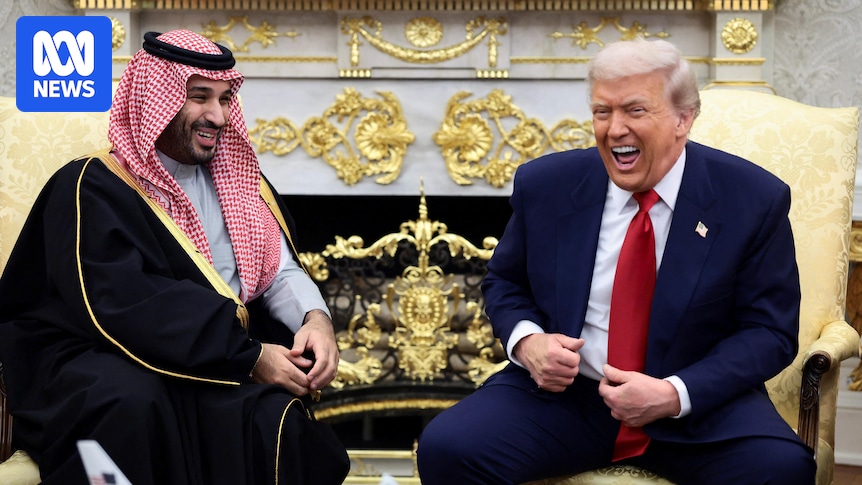
Shock and dismay have become routine reactions to the myriad pronouncements and strategic shifts emanating from the Trump White House. This week, two particular developments captured global attention, highlighting significant geopolitical tensions.
The first involved a controversial deal between President Donald Trump and Saudi Arabia’s Crown Prince Mohammed bin Salman to purchase US F-35 jets. Concerns about potential technology leaks to China were overshadowed by the timing of the agreement, which coincided with Trump’s dismissive comments regarding the Crown Prince’s alleged involvement in the murder of journalist Jamal Khashoggi.
Israel’s Concerns Over F-35 Sales
Amid this backdrop, Israel expressed unease over the sale of F-35 jets to Saudi Arabia. Historically, the US has ensured Israel’s “qualitative military edge” in the region, partly by restricting F-35 sales to other Middle Eastern countries. The Israeli Air Force has reportedly opposed the Saudi sale, prompting Prime Minister Benjamin Netanyahu to publicly downplay the issue.
“Regarding the F-35, I had a long conversation with Secretary of State Marco Rubio, who reiterated his commitment that the United States will continue to preserve Israel’s qualitative military edge,” Netanyahu stated.
Meanwhile, Trump’s broader strategy of selling US military hardware as part of his “America First” policy continues. His administration has pledged to co-build nuclear submarines with South Korea and sell weapons to Europe, ostensibly to bolster Ukraine’s defense capabilities.
Trump’s Controversial Ukraine ‘Peace Plan’
The second major development involved a new “peace plan” for Ukraine, reportedly drafted by the Trump administration without Ukrainian input. The plan, which surfaced in media reports, would require Ukraine to cede territory, reduce its military, and relinquish key weapons—concessions long sought by Russian President Vladimir Putin.
The Financial Times reported that “the Trump administration had told Zelenskyy and other people in his team that the White House was working to an ‘aggressive’ timeline to finalise the proposal.”
The European Union swiftly rejected the plan, with top diplomat Kaja Kallas stating, “The pressure must be on the aggressor, not on the victim. Rewarding aggression will only invite more of it.”
Europe’s Struggle for Agency
Europe’s reaction underscores a deeper issue: its perceived lack of agency in the conflict. European nations, having agreed to purchase US weapons for Ukraine, expected a greater role in shaping the region’s future. A senior European official lamented, “How do Europeans have so little agency here even when we’re now paying the entire bill?”
The sense of vulnerability is exacerbated by Russia’s increasing military presence near Western Europe and ongoing attacks on Ukraine. Although US sanctions on Russian oil firms are poised to take effect, Ukraine faces financial strain and internal corruption challenges, complicating European allies’ support efforts.
The delay in releasing billions of dollars in loans to Ukraine, tied to frozen Russian assets, further illustrates Europe’s precarious position. Belgium, in particular, fears legal repercussions and economic fallout if it releases the funds.
Europe’s Military Spending and Self-Reliance
In response to these challenges, European leaders like France’s Emmanuel Macron and Germany’s Friedrich Merz advocate for increased military self-reliance. The EU’s trade and economic security commissioner, Maros Sefcovic, echoed this sentiment, emphasizing the need for smarter defense spending.
“The decision taken at NATO to increase military spending to 5 percent of GDP means that we want not only to spend more but in a smart way,” Sefcovic stated. He highlighted the SAFE program, which aims to streamline military procurement and reduce fragmentation across European defense industries.
As Europe reconfigures its industrial base towards military production, the pace of this transition will significantly impact its future agency and strategic autonomy. The continent’s ability to assert itself on the global stage hinges on these developments, as does its relationship with the US.
Ultimately, the interplay between Europe’s military ambitions and the US’s strategic maneuvers will shape the geopolitical landscape in the coming years, with profound implications for global security and stability.







